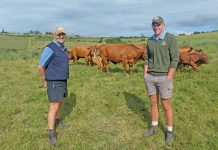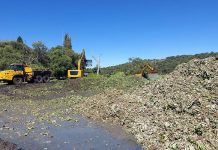The slow pace of land reform in South Africa is a reality, and the unfortunate result is that land claimants and landowners sometimes take out the resulting frustrations on each other. But in northern KZN, a local dominee has brokered a unique agreement between these parties following tension that spun out of control. Lloyd Phillips reports on a partnership between the Landless People’s Movement and the Agricultural District Union of Northern KZN.
For a number of years agriculture in northern KZN, including the areas of Newcastle, Utrecht, Groenvlei, Ngogo, Normandien and Dannhauser, has been considered a hotbed for tensions between landowners and land claimants. However, despite their opposing differences, the Agricultural District Union of Northern KZN (ADUNKZN) and the Landless People’s Movement (LPM) are banding together to overcome land reform challenges.
Picking a side
Most farmers in this region have been members of the formal agricultural organisation, the ADUNKZN, which has formally represented their land reform grievances to government. On the other hand, until the late 1990s, numerous small groups of land claimants in the region generally represented their interests themselves. Conflicts between farmers and land claimants in northern KZN therefore tended to be limited and isolated. B ut by the late 1990s it was clear that government’s pre-1994 promises of speedy land handovers to claimants weren’t being kept, and the willing-seller, willing-buyer principle government had touted as the means to the speedy resolution of land claims appeared less fruitful than anticipated. Disgruntled, land claimants all over South Africa mobilised to form what would become the LPM.
Two sides of the story
The national organiser of the LPM, Mangaliso Khubeka, told Farmer’s Weekly his movement was initially formed as a united front to tackle the government on the slow pace of land reform in the country, including in northern KZN. However, when government began telling the LPM that the blame for the stalled pace of land reform should be placed solely at the door of farmers, because the latter were supposedly inflating land prices, the LPM began changing its focus to tackle farmers as the root cause of the delays. President of the ADUNKZN, Jannie Kemp, added that on the other hand, when his union approached the region’s local Department of Land Affairs (DLA) for clarity on unresolved land claims, they’d be told all decisions were made at provincial level.
The ADUNKZN would then try to get answers from the provincial head office of the KZN DLA, mostly with no luck. ore importantly, in most cases farmers were agreeing with the land values being determined by government-appointed valuators. However, government was slow in paying the settled claims. This meant the agreed-upon sums were depreciating, and farmers were starting to seek the current equivalent value to the sums agreed upon years ago. According to Jannie, the government then began saying that farmers were unfairly inflating land prices. “This whole situation led to uncertainty among farmers in northern KZN about unresolved land claims,” Jannie remembers, “The added problem was that banks were hesitant to give production loans to farmers who had land claims pending against their farms.”
“Farmers therefore couldn’t make improvements to their farming operations. The resulting financial stresses often resulted in anger boiling up, with the only accessible targets for these frustrations being land claimants and labour tenants.”
The reverend gets involved
Reverend Schalk Scott, of the Dutch Reformed Church in Newcastle, has seen first-hand the hostilities that erupted between farmers and land claimants. “There have been incidents where farmers and land claimants have been facing each other at gunpoint in this area,” he points out. “The two sides have intimidated each other, made threats, and also carried out physical hostilities. This was all as a result of the uncertainties created by the stalled land claims process. The fact that it appeared that the government was playing the two sides off against each other over land issues also significantly fanned tensions in the region.”
Earlier this year, Rev Scott attended a KZN Council of Churches meeting where he heard about the LPM’s grievances and allegations against farmers, which he says he knew were just not true because he had a number of farmers in his congregation and had been involved in the northern KZN farming community for a long time. As a result, he decided to contact Mangaliso, who was then the acting leader of the LPM’s northern KZN membership, to discuss the LPM’s views on farmers and the land claims process.
Common ground
“Mangaliso and I discovered that we shared very similar Christian principles, but that we had been driven apart by our misperceptions of each other and not by facts,” Rev Scott continued. “We also discovered that we had a lot more in common than we had differences. “We thought that if he and I could have such a civil and meaningful discussion over land claim issues, then surely the LPM and the ADUNKZN could do the same. After all, Mangaliso represented the LPM in northern KZN and I was part of the region’s farming community.”
As the elected representative on the Dutch Reformed Church General Synod’s Land Reform Task Group, Rev Scott was an ideal facilitator for meetings between the northern KZN LPM (LPMNKZN) and the ADUNKZN. The first formal meeting took place on 5 September 2008 at a neutral venue in Newcastle. While members of the two groups were initially very wary of each other, based on past hostile encounters between them, in the spirit of the event the two parties made a commitment to hear each other out without interruption. Rev Scott remembers, ”The meeting turned out to be very illuminating for the two parties because, during the course of the discussion, they came to realise that they actually had more grievances against the government about the land reform process than they did against each other.”
Standing together In a recent meeting with Farmer’s Weekly, Mangaliso and Jannie, representing two organisations that a month ago were blind enemies with apparently diametrically opposed standpoints, issued views they both wholeheartedly agreed on. They pointed out the many laws that have been enacted about labour relations, land issues and the like have been contradictory, and created confusion among labour tenants, land claimants and farmers. Inevitably, the affected parties have differences over the interpretation of these many laws, resulting in a breakdown in trust and leading to hostilities.
As a result of the groundbreaking first meeting, both the LPMNKZN and the ADUNKZN now understand that neither was responsible for the slow pace of land reform in their region, but that the government was clearly at the root of the problem. In addition, each of the two parties have had the good of the country at heart, but lost sight of this due to the misperceptions they had about each other.
Putting it in writing Immediately following the meeting, what could be called a historic document was issued jointly by the LPMNKZN and the ADUNKZN outlining their goals, which are now to be jointly pursued. “We came to a mutual understanding of the problems that both parties have faced over the past 14 years, and we acknowledge that our frustration is not with each other, but with the system that is delaying the process of land reform,” the document reads. “We have gained a new appreciation of each others’ situation and have decided to leave behind any race qualification. “We are people with a specific situation and specific needs, and we will regard each other as such.
“Our specific common ground is ‘South Africa First’. Everything we do will be with the best interest of the country in mind. Food for the people is in the best interest of the country, and every action taken with regard to land reform must serve this goal.” Rev Scott adds, “There were even more very promising declarations in the document. The two parties have undertaken that they will no longer hold separate meetings with government departments dealing with land reform, but will instead notify each other to join any meetings that are scheduled with the government in future. “No longer will grassroots conflicts between farmers and landless people in northern KZN be allowed to escalate out of control. Any differences will immediately be dealt with in constructive meetings between the two parties.” The LPMNKZN and the ADUNKZN also offered each other whatever help they might need in dealing with land-reform related issues, where feasible.
The goodwill spreads
Rev Scott is especially pleased to note that since hearing of this groundbreaking partnership deal, the Association for Rural Advancement – another organisation representing the interests of the landless in KZN – also committed itself to working together with the LPMNKZN and the ADUNKZN in achieving a positive outcome for all in the land reform process. All the stakeholders in this partnership have agreed they’d like to see the concept used in other areas of South Africa. The KZN Council of Churches is also seriously considering becoming an official facilitator in establishing similar partnerships.
Rev Scott explains that the ecumenical Church in KZN fundamentally supports the promotion of peace and righteousness, and so it has the potential to objectively facilitate peace throughout the land reform process. Rev Scott said the next step of the now tripartite partnership includes drawing up a comprehensive plan of action for dealing with land reform issues in northern KZN in a manner satisfactory to the parties. This plan will include bringing in agricultural technology services to provide accurate information that can be used when approaching government.
The partnership is also seeking ways to constructively deal with day-to-day conflicts that might emerge between farmers and the landless in the region. “We’re just going to take things one small step at a time,” concluded Rev Scott.
A united front Meanwhile, Jannie added, “Having accurate facts has the great potential to diffuse conflict. “Animosity is often the result of people not having all the correct facts at hand. Most of the members of the ADUNKZN have great faith in the promise held by this partnership.” Mangaliso concluded, “The country is ready for this type of partnership. We’ve been singing about the rainbow nation for a long time now, but we have actually not truly seen it yet. Now is the time to join hands and build that rainbow nation.” For more information contact Rev Schalk on 082 806 7484 or e-mail [email protected]. A full draft of the partnership document between the LPMNKZN and ADUNKZN can be viewed at www.ngkerk.org.za, under the news section of the KwaZulu-Natal Synod. |fw








